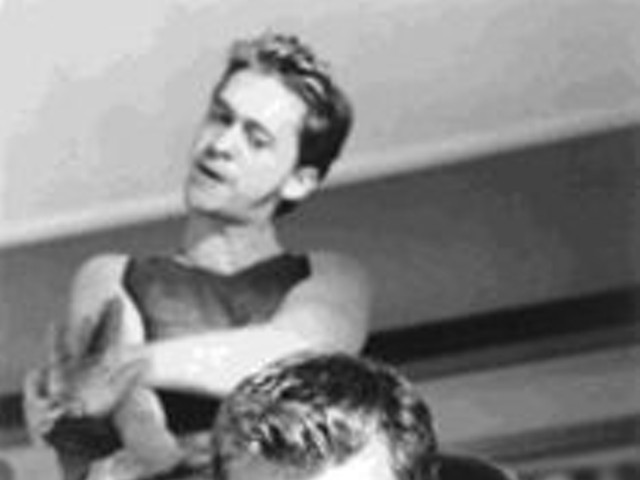The Chosen, which is on view at the New Jewish Theatre, is an adaptation of Chaim Potok's revered novel that pits traditional faith against secular culture. The book itself is something of a miracle -- or at least an anomaly. How did this contemplative meditation on the closeted world of Hasidic Jews find such an immediate and responsive audience when it was published in 1967, a raucous, war-torn, pot-drenched year when our cultural icons included such irreverent antiheroes as the Doors, Bonnie and Clyde and Benjamin Braddock, The Graduate? Perhaps at the time people were most in need of strictures and parameters, which is what this story is finally about.
Set against a background of such turbulent events as World War II and the creation of Israel, The Chosen chronicles four formative years (1944-48) in the often-strained friendship between two teenagers. Although Danny Saunders (Jeremy Sher) and Reuven Malter (Josh Bywater) live just five blocks apart in Brooklyn, they inhabit totally different worlds. Danny is the brilliant son of a fanatical Hasidic rabbi (Kevin Beyer). Though Danny is expected to follow in his father's footsteps, he is eager to be exposed to the heretical world of Freudian psychology. His new, accidental friend, Reuven, is the Orthodox son of a scholar (Ray Shea) whose secular writings put him at odds with the Hasidim. Yet Reuven is fascinated by this cloistered world and yearns to learn more about the intricacies of the Talmud.
On its most external level, The Chosen deals with how we choose our friends. But it also is concerned with a multitude of life decisions -- decisions that determine how fathers raise their sons, how children define obedience to their parents and how individuals come to terms with their God. "My father once told me that a Jew's only mission in life is to obey God," Danny declares, "but sometimes I just don't know what God wants." And so The Chosen is also about the ambivalence that leads to the undoing of blind dogma. This might sound like tangled, esoteric stuff. But because the story is not so much about abstract ideas as it is about the ideas that people live by and act upon, the play provides an evening of probing drama.
Bryan Schulte's set design sets the tone. At either end of the rear wall stands a pillar (pillars of learning?). Between the pillars hangs a surrealistically large backdrop of books. None of the spines bears a title. But the audience can imagine them as the tomes discussed onstage: the works by Freud and Hemingway that Danny is forbidden to read but which are commonplace in Reuven's home. Education and learning are always at the core of this production, which is thoughtfully directed by Deanna Jent.
That the play works as well as it does is also a credit to the five actors, all of whom do persuasive and effective work. The rabbi, for instance, would be easy to stereotype; instead, Kevin Beyer transforms him into a proud man of confused humanity. As the play's narrator, Will Ledbetter performs with admirable restraint. Ledbetter has one of the most difficult assignments, acting a role that is overwritten and under-needed.
This brings us to the play's key flaw. In telling this story of faith redefined, the script is too faithful to the from which it was drawn. If The Chosen requires a narrator at all (and I'm not sure that it does), he should be there to advance the action. But too much of what this narrator has to say is redundant and intrusive; it's as if he's simply onstage to remind the viewer that The Chosen was originally a novel, which should be irrelevant to an evening of theater.
Alas, the narrator is not the only overwritten role. One of the key plot elements concerns the silence in which Danny has been raised, for his father only rarely speaks to him. At novel's end, in a speech that continues for seven pages, the rabbi strives to reconcile with his son. When the novel was filmed in 1981, not even Rod Steiger could make that marathon speech work. One would have hoped that for this stage version, adaptor Aaron Posner would have learned from the film's error and found a way to drastically distill that speech while still retaining its essence and intent.
Not to be. Once again, we get more -- a lot more -- than we are able to absorb, with the unhappy result that even as the play is drawing to its climax, its impact is diminished. But for the most part, The Chosen offers a unique journey into a world rarely glimpsed.
So who wrote Anton in Show Business, the current offering by (Mostly) Harmless Theatre? There's a rumor floating about that purported author Jane Martin is actually Jon Jory, who spent more than a quarter-century as the successful artistic director of the Actors Theatre of Louisville. This makes sense. For starters, a gender-bender author would be consistent with the rationale behind having Anton's all-female cast also perform the male roles. More important, it would explain the play's authority. Clearly this highly enjoyable spoof of a regional-theater production of Chekhov's Three Sisters was written by someone who knows the territory.
The premise is terrific. A sexy soap-opera diva (Linda Meade) wants to pursue decent movie roles by pumping up her résumé with some serious theater credits. "Then you're a classic actress with really great breasts," she explains. After being warned by her agent that if she's going to try to act, she'd best do it where no one in the business will see her, she winds up portraying Masha in a backwater theater in San Antonio that is beset by a myriad of unpredictable mishaps. Anyone who has ever worked in the theater is going to laugh a lot, especially in Act 1.
But somewhere along the way, the author -- whoever he/she is -- apparently decided that writing a comedy wasn't challenge enough. So every once in a while the play tries to tackle a "theme," as if it wants to be taken seriously. (Who says you can't take a comedy seriously?) By evening's end, the script has ceased doing what it does best, instead calling attention to the fact that -- laugh lines aside -- we're left with a grab bag of eclectic, unresolved issues and characters.
Are we supposed to care about the actress who has learned she has breast cancer (Erin Whitten) or the tobacco industry's callous funding of the arts? I hope not, because the script doesn't. Yet there is such an abundance of hilarious material, I'm sure this play will become a mainstay of community theaters for years to come, and everyone who works on it will have a therapeutic ball.
Ironically, and somewhat sadly, Anton in Show Business has nothing to do with its namesake, Anton Chekhov. Except for the inclusion of a wonderful old émigré director (Elizabeth Watt), who supplies the evening with a touch of wisdom and compassion, the San Antonio theater might be staging any old play with three actresses. (How about Crimes of the Heart?) Nor does the regional-theater movement have much to do with "show business."
So what is this mistitled comedy that is neither vitriolic enough to qualify as satire nor deft enough to qualify as farce? If, at the outset, it begins as a laundry list of accumulated punchline observations, ultimately it becomes a love letter. Toward the end of the play, the most starry-eyed of our three sisters (Annalise Portnoy) describes a community-theater production of A Raisin in the Sun that touched lives. Her account is a poignant reminder that ever so occasionally, theater surprises and delights us, as this play does. All too often it disappoints us, as this play does. But when, as this play does, theater is able, through its own mirror reflection, to remind us why -- despite the constant disappointments, and ever in hope of new surprises -- we continue to attend, then it has served a reaffirming role indeed.





